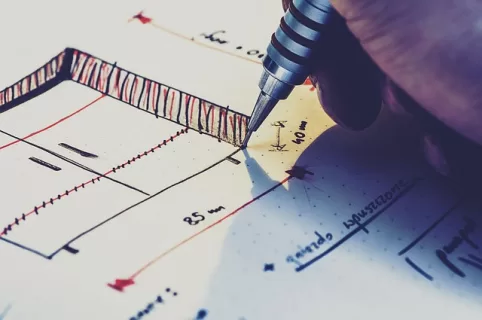Managing complex construction projects is no easy task. The pressure to deliver high-quality outcomes on time and within budget can feel overwhelming.
This blog post will act as a helpful guide, offering vital software tips to construction managers who seek to transform challenges into triumphs.
By exploring essential strategies, leveraging technology like reliable construction scheduling software, and communicating effectively, you’ll gain the insights needed to lead your projects to success.
Unraveling the Challenges of Complex Construction Projects
Construction projects are multifaceted undertakings by nature. They require the careful coordination of numerous tasks, teams, and timelines. Complexity arises when you add layers such as diverse stakeholders, regulatory demands, and fluctuating resources.
For construction managers, the ability to balance these variables is crucial.
External Factors and Forces
One significant challenge is the unpredictability of external factors. Weather conditions can delay schedules, while supply chain disruptions can impact material availability. Additionally, the intricacies of design changes or unforeseen site conditions further complicate management efforts. Recognizing these challenges is the first step toward developing effective solutions.
Project Scale and Complexity
Another aspect of complexity is the sheer scale of large projects. Coordinating everyone from architects to subcontractors requires a robust approach. With so much at stake, construction managers must be equipped with strategies to simplify processes, reduce risks, and enhance collaboration across diverse teams.
10 Essential Tips for Effective Construction Project Management
The key to navigating complex projects lies in adopting effective project management practices. Here are ten proven tips to help you manage even the most daunting construction endeavors:
1. Plan Meticulously
Developing a comprehensive project plan is non-negotiable. This involves setting clear objectives, timelines, and resource allocations. By anticipating challenges and identifying critical paths, you ensure smoother execution.
2. Leverage Technology
Modern software tools can revolutionize construction management. From Building Information Modeling (BIM) to Project Management Information Systems (PMIS), technology aids in visualizing, scheduling, and tracking progress efficiently.
3. Communicate Clearly
Open lines of communication are vital. Regular updates, meetings, and feedback loops keep all stakeholders informed and aligned. Utilize digital communication platforms for seamless information sharing.
4. Foster Team Collaboration
Encourage a culture of collaboration among your teams. When everyone works cohesively towards common goals, it enhances productivity and minimizes conflicts.
5. Implement Risk Management Strategies
Identifying potential risks early on allows you to mitigate them before they escalate. Develop contingency plans and conduct regular risk assessments to stay proactive.
6. Monitor and Adapt
Continuous monitoring of project milestones ensures you’re on track. Be ready to adapt when deviations occur, adjusting plans and resources as needed.
7. Focus on Quality Assurance
Consistency in quality standards is paramount. Regular inspections and compliance checks guarantee that the final output meets the desired specifications.
8. Budget Wisely
Financial oversight is crucial. Ensure accurate cost estimates and track expenses diligently to avoid budget overruns.
9. Prioritize Safety
Safety should never be compromised. Enforce stringent safety protocols and conduct training sessions to minimize accidents and maintain a secure work environment.
10. Learn from Experience
Reflecting on past projects provides valuable insights. Analyze successes and failures to refine your future approaches and continuously improve.
Technology’s Role in Streamlining Project Management
Technology has transformed the construction industry, offering tools that streamline processes and enhance outcomes. From project initiation to completion, technological advancements drive efficiency and innovation.
Building Information Modeling (BIM) revolutionizes construction planning. It provides a collaborative platform for architects, engineers, and contractors to visualize designs and detect potential clashes before construction begins. This minimizes delays caused by rework and ensures design integrity.
Construction Scheduling Software simplifies the tracking of schedules, budgets, and resources. Automated dashboards offer real-time insights, allowing managers to make informed decisions swiftly. Such systems enable proactive responses to deviations and ensure projects remain on course.
Drones and AI-powered analytics improve site monitoring. Drones capture aerial imagery, providing accurate data on progress and potential issues. AI algorithms analyze this data to offer predictive insights, allowing for timely interventions to prevent setbacks.
Navigating Stakeholder Communication and Team Coordination
Effective communication is the cornerstone of successful project management. Every stakeholder’s input, from clients to subcontractors, is vital to ensuring smooth operations. However, managing diverse teams and expectations requires a strategic approach.
Establishing clear communication channels fosters transparency. Regular updates via emails, meetings, or digital platforms ensure everyone is on the same page. Visual aids such as Gantt charts and project timelines simplify complex information.
Active listening plays a crucial role in understanding concerns and suggestions. Encouraging open dialogue builds trust, enabling stakeholders to voice opinions without hesitation. Addressing issues promptly prevents misunderstandings from escalating.
Team coordination benefits from a collaborative atmosphere. Encouraging cross-functional teams to share insights and collaborate on solutions enhances creativity. Celebrating achievements boosts morale and strengthens team cohesion.
Risk Management and Contingency Planning
Construction projects are inherently risky, with potential pitfalls at every stage. Effective risk management is about identifying threats early and devising strategies to mitigate them. Contingency planning ensures readiness for unexpected challenges.
Risk identification involves a thorough assessment of potential issues. These can range from environmental factors impacting schedules to financial constraints affecting resources. Identifying risks early enables proactive solutions.
Developing contingency plans is essential. For instance, having backup suppliers for materials minimizes delays if the primary source faces disruptions. This preparedness ensures projects can continue smoothly despite unforeseen hurdles.
Conclusion – Crafting a Path to Project Success
Mastering complex construction projects demands a strategic blend of skills, insights, and tools. Construction managers can transform challenges into opportunities by adopting these essential tips and leveraging software technology. Effective communication, risk management, and collaboration pave the way for seamless execution.
Remember, while each project presents unique obstacles, the principles discussed here provide a robust foundation. By honing your project management prowess, you ensure successful outcomes and enduring relationships with stakeholders.

